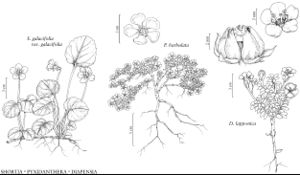Difference between revisions of "Diapensia"
Sp. Pl. 1: 141. 1753.
Gen. Pl. ed. 5, 69. 1754 ,.
FNA>Volume Importer |
FNA>Volume Importer |
||
| Line 64: | Line 64: | ||
|publication year=1753; | |publication year=1753; | ||
|special status= | |special status= | ||
| − | |source xml=https://jpend@bitbucket.org/aafc-mbb/fna-data-curation.git/src/ | + | |source xml=https://jpend@bitbucket.org/aafc-mbb/fna-data-curation.git/src/f50eec43f223ca0e34566be0b046453a0960e173/coarse_grained_fna_xml/V8/V8_666.xml |
|genus=Diapensia | |genus=Diapensia | ||
}}<!-- | }}<!-- | ||
-->[[Category:Treatment]][[Category:Diapensiaceae]] | -->[[Category:Treatment]][[Category:Diapensiaceae]] | ||
Revision as of 22:30, 16 December 2019
Subshrubs, forming tussocks, cushions, domes, or mats, caulescent, taprooted. Stems mostly prostrate to decumbent, branched; branches procumbent or decumbent to erect. Leaves cauline, mostly opposite or compactly whorled, densely imbricate or crowded, 3–15 mm; petiole present or absent; blade oblong-lanceolate to narrowly spatulate, obovate, or spatulate-elliptic, slightly falcate, margins entire, apex acute or obtuse, surfaces glabrous, appearing 1-veined, sometimes with 1–2, indistinct, lateral veins. Inflorescences solitary flowers, pedicellate to subsessile, immediately subtended by 2–3 bracts. Pedicels ebracteate, elongating after anthesis. Flowers: sepals distinct or connate proximally; petals connate in proximal 1/2, corolla cupulate to campanulate, 7–10 mm, lobes white to cream or pinkish tinged to rose, margins entire; anthers 2-locular, without basal spurs, longitudinally dehiscent; filaments adnate to corolla tube; staminodes absent or vestigial. x = 6.
Distribution
North America, n Europe, Asia.
Discussion
Species 5 (2 in the flora).
The three temperate species of Diapensia are endemic to the Sino-Himalayan Mountains. They differ as a group from the two boreal species by their production of vestigial staminodes (see F. Ludlow 1976).
Selected References
Lower Taxa
Key
| 1 | Plants forming tussocks; branches not adventitiously rooted; leaf blades oblong-oblanceolate to narrowly spatulate, 7-15 × 1.3-2.3 mm, margins with narrow hyaline flange proximally. | Diapensia lapponica |
| 1 | Plants usually forming mats or low mounds or cushions; branches adventitiously rooted; leaf blades obovate to spatulate-elliptic, 3-8(-12) × 1.5-2.2(-3) mm, margins sometimes with narrow hyaline flange. | Diapensia obovata |
